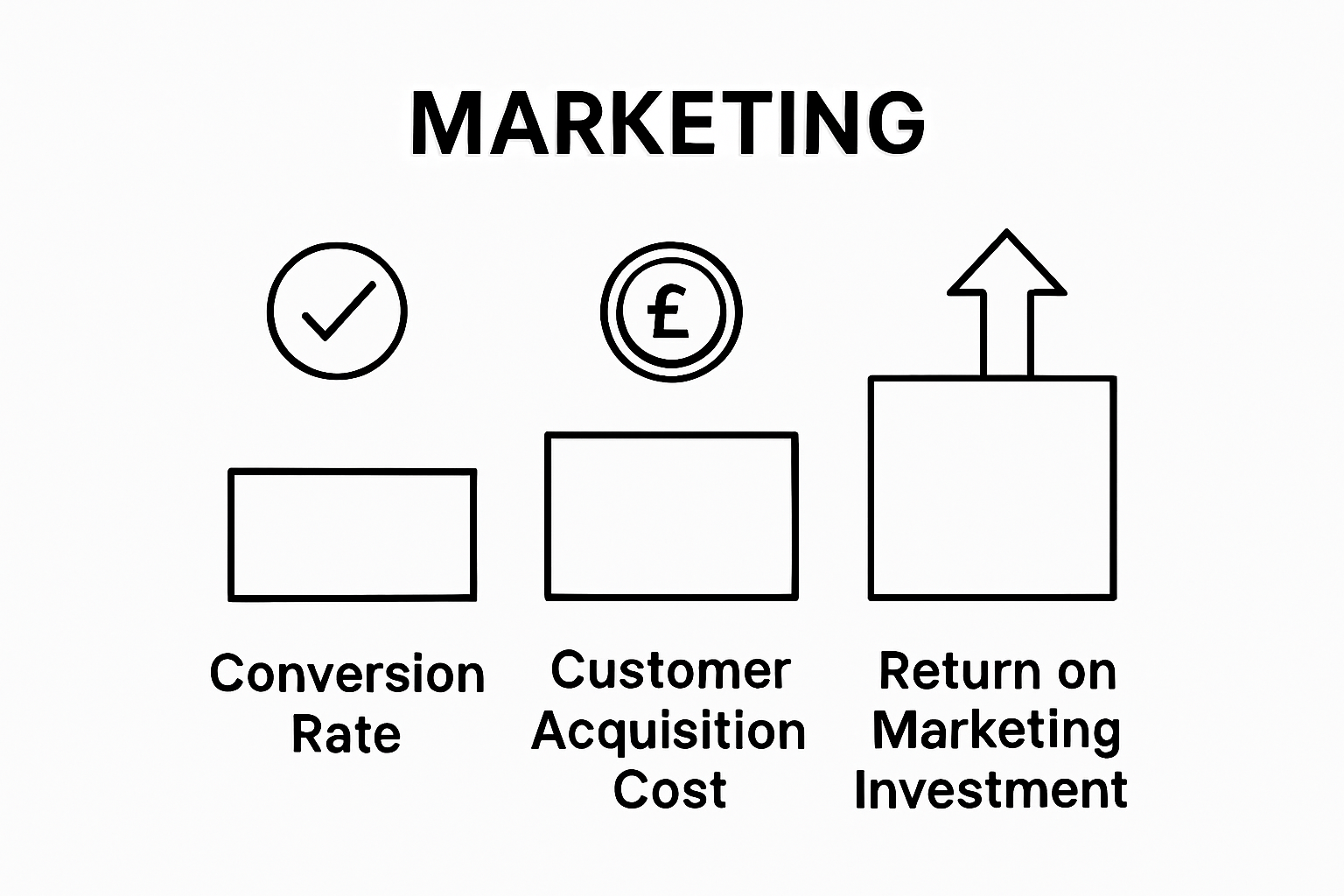Marketing analytics sounds like something reserved for tech giants and global brands, but it is changing the game for businesses of every size. Imagine this. Companies using robust marketing analytics have seen measurable increases in efficiency and customer engagement, leading to stronger business growth and real competitive advantage. Surprising as it may be, the true power lies not just in collecting data but in transforming it into sharp, strategic insights that let ordinary businesses outperform even their biggest rivals.
Table of Contents
- What Is Marketing Analytics And Its Importance?
- Key Metrics That Matter In Marketing Analytics
- How Marketing Analytics Drives Business Decisions
- The Role Of Data Collection In Marketing Analytics
- Real-World Applications Of Marketing Analytics
Quick Summary
| Takeaway | Explanation |
|---|---|
| Marketing analytics enhances decision making. | It empowers businesses to make data-driven choices, reducing reliance on intuition and improving strategic planning. |
| Key metrics drive marketing success. | Tracking metrics like conversion rate and customer acquisition cost helps evaluate the effectiveness of marketing campaigns. |
| Data collection is essential for insights. | Systematic gathering of customer data across various channels allows for comprehensive understanding of behaviors and preferences. |
| Predictive analytics forecasts market trends. | By analyzing historical data, businesses can anticipate shifts in customer preferences and market conditions, enabling proactive strategies. |
| Ethical data practices build customer trust. | Responsible data collection ensures compliance with privacy regulations and maintains transparency, fostering customer loyalty and confidence. |
What is Marketing Analytics and Its Importance?
Marketing analytics represents a sophisticated approach to understanding and optimizing marketing performance through comprehensive data analysis. At its core, this discipline transforms raw customer interaction data into actionable strategic insights that drive business growth and competitive advantage.
Defining Marketing Analytics
Marketing analytics goes beyond simple data collection, providing a systematic method for measuring, managing, and analyzing marketing performance. Our guide on digital marketing analytics reveals that businesses can leverage these techniques to gain profound understanding of customer behavior, campaign effectiveness, and return on marketing investments.
Key characteristics of marketing analytics include:
- Transforming complex data sets into comprehensible insights
- Identifying precise customer segments and preferences
- Tracking performance metrics across multiple marketing channels
Strategic Importance for Businesses
According to Harvard Business Review, organizations implementing robust marketing analytics strategies can experience significant competitive advantages. These advantages manifest through:
- Enhanced decision making based on empirical evidence
- More efficient allocation of marketing resources
- Improved understanding of customer journey and interaction patterns
Marketing analytics enables businesses to move from reactive to predictive strategies, anticipating market trends and customer needs with remarkable precision. By utilizing advanced data interpretation techniques, companies can develop targeted marketing approaches that resonate more effectively with their intended audience, ultimately driving increased engagement and conversion rates.
Key Metrics That Matter in Marketing Analytics
Marketing analytics success hinges on understanding and tracking the right performance metrics. These indicators provide crucial insights into marketing effectiveness, customer engagement, and overall business growth strategies.

Performance and Conversion Metrics
Our comprehensive guide on analytics metrics highlights critical measurements businesses should monitor. Conversion metrics represent the most fundamental indicators of marketing success, revealing how effectively marketing efforts transform potential customers into actual purchasers.
Key conversion metrics include:

- Conversion rate: Percentage of visitors completing desired actions
- Customer acquisition cost: Total expense of acquiring a new customer
- Return on marketing investment: Financial returns generated from marketing expenditures
Traffic and Engagement Analysis
According to Google Analytics, understanding website traffic patterns provides invaluable insights into customer behavior. Businesses can evaluate performance through metrics such as:
- Website visitors
- Average session duration
- Bounce rate
- Traffic sources
These metrics help organizations understand audience interactions, identify potential improvements, and refine marketing strategies. By examining how users navigate websites and engage with content, marketers can develop more targeted and effective campaigns that resonate with their specific audience demographics.
Below is a table outlining the most important marketing analytics metrics discussed in the article and their primary interpretations for business performance evaluation.
| Metric | Description |
|---|---|
| Conversion rate | Proportion of visitors who complete a desired action |
| Customer acquisition cost | Total expense incurred to acquire a new customer |
| Return on marketing investment | Financial return generated from marketing expenditures |
| Website visitors | Total number of individuals visiting the website |
| Average session duration | Average length of time users spend on the website |
| Bounce rate | Percentage of visitors leaving the site after one page |
| Traffic sources | Origin of visitors (e.g., search, direct, referral, social) |
How Marketing Analytics Drives Business Decisions
Marketing analytics transforms raw data into strategic intelligence, enabling businesses to make informed, precise decisions that directly impact organizational performance and growth. By translating complex data patterns into actionable insights, companies can navigate increasingly competitive markets with confidence.
Strategic Decision Making
Our guide on data analysis for marketers reveals how analytics provides critical information for strategic planning. Data-driven decision making allows businesses to move beyond intuition, replacing guesswork with empirical evidence.
Key strategic decision areas include:
- Resource allocation
- Product development priorities
- Customer targeting strategies
- Marketing channel optimization
Predictive Insights and Risk Management
According to McKinsey Global Institute, predictive analytics enables businesses to anticipate market trends and potential challenges. By analyzing historical data and current performance metrics, organisations can:
- Forecast potential market shifts
- Identify emerging customer preferences
- Mitigate potential business risks
- Develop proactive strategic responses
Marketing analytics empowers businesses to transform complex data into meaningful strategic guidance, creating a competitive advantage through intelligent, informed decision making. This approach ensures that every business strategy is grounded in robust, verifiable insights rather than speculative assumptions.
The Role of Data Collection in Marketing Analytics
Data collection serves as the fundamental cornerstone of effective marketing analytics, providing the raw material from which actionable insights are derived. This process involves systematically gathering and organizing information about customer interactions, behaviors, and preferences across multiple digital and physical touchpoints.
Data Collection Methodologies
Our comprehensive guide on user data collection highlights the critical techniques businesses employ to capture meaningful customer information. Comprehensive data collection encompasses multiple channels and interaction points, ensuring a holistic understanding of customer journeys.
Primary data collection methods include:
- Website analytics tracking
- Customer survey responses
- Social media interaction monitoring
- Transaction and purchase history analysis
- Email engagement metrics
Ethical Considerations and Data Privacy
According to European Data Protection Board, responsible data collection requires strict adherence to privacy regulations and ethical standards. Businesses must balance the need for insights with robust data protection practices.
Key ethical data collection principles involve:
- Obtaining explicit user consent
- Transparent communication about data usage
- Implementing secure data storage mechanisms
- Providing clear opt-out mechanisms
- Anonymising sensitive personal information
Effective data collection transforms raw information into a strategic asset, enabling businesses to understand customer behaviors, predict market trends, and make informed marketing decisions with unprecedented precision and confidence.
This table summarizes the primary data collection methodologies and ethical principles essential for effective and responsible marketing analytics implementation in business.
| Data Collection Methodology | Ethical Principle | Explanation |
|---|---|---|
| Website analytics tracking | Explicit user consent | Gain permission before collecting data |
| Customer survey responses | Transparent data usage communication | Clearly inform users about data collection and intended use |
| Social media interaction monitoring | Secure data storage | Protect collected information against unauthorized access |
| Transaction and purchase history | Opt-out mechanism | Allow users to refuse or withdraw from data collection |
| Email engagement metrics | Anonymisation of personal information | Remove identifiers to protect individuals' privacy |
Real-World Applications of Marketing Analytics
Marketing analytics transcends theoretical concepts, delivering tangible value across diverse business sectors. By transforming complex data into strategic insights, organizations can make precise, informed decisions that drive significant performance improvements and competitive advantages.
Industry-Specific Performance Optimization.
Our marketing analytics strategies guide demonstrates how different industries leverage analytics to enhance their operational effectiveness. Targeted analytics allow businesses to understand unique market dynamics and customer behaviors specific to their sector.
Key industry application areas include:
- Retail: Personalizing customer experiences
- Financial services: Risk assessment and fraud prevention
- Healthcare: Patient engagement and treatment effectiveness tracking
- Technology: Product development and user experience improvement
- Hospitality: Dynamic pricing and customer retention strategies
Practical Implementation Strategies
According to Gartner Research, successful marketing analytics implementation requires a structured approach that integrates technology, processes, and human expertise. Organizations can achieve this by:
- Developing cross-functional analytics teams
- Investing in advanced data processing technologies
- Creating standardized measurement frameworks
- Establishing clear performance benchmarks
Marketing analytics transforms raw data into a strategic compass, guiding businesses through complex market landscapes with unprecedented precision and insight. By embracing data-driven methodologies, companies can unlock new levels of operational excellence and customer understanding.
Elevate Your Analytics With Accurate Conversion Tracking
Are you frustrated by gaps in your marketing data or the risk of missing crucial conversions? The core message from "Understanding Marketing Analytics Basics for Businesses" is clear. Businesses need trustworthy data and precise tracking to unlock actionable insights and sharpen their strategic edge. But traditional analytics methods often lead to data loss, incomplete conversion measurement and leave you doubting if your marketing decisions truly reflect customer behavior.
AdPage provides a platform that empowers e-commerce businesses and agencies to overcome these challenges. With robust server-side tagging solutions, you can achieve 100% conversion monitoring, mitigate data loss and ensure compliance with GDPR requirements. Experience the benefits of seamless integration with popular platforms such as Shopify, WooCommerce and Magento while making privacy and consent management effortless.

Ready to transform complex data into clear commercial results? Visit AdPage's homepage and discover how accurate tracking, detailed reporting and secure consent management can take your marketing analytics from reactive to truly predictive. Get started today to fully understand and optimize your marketing performance before the competition does.
Frequently Asked Questions
What is marketing analytics?
Marketing analytics is a systematic approach that involves measuring, managing, and analyzing marketing performance based on customer data. It transforms raw data into insights that help businesses understand customer behavior and campaign effectiveness.
How can marketing analytics benefit my business?
Implementing marketing analytics can lead to improved decision-making, more efficient resource allocation, and a deeper understanding of customer interactions, allowing your organization to anticipate market trends and enhance marketing strategies.
What key metrics should I track in marketing analytics?
Important metrics to monitor include conversion rates, customer acquisition costs, return on marketing investment, and website engagement metrics like average session duration and bounce rate.
How does data collection impact marketing analytics?
Data collection is crucial as it provides the raw information necessary for marketing analytics. Effectively gathering and organizing data on customer interactions enables businesses to derive actionable insights and make informed marketing decisions.



.png)
